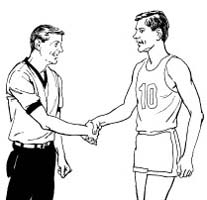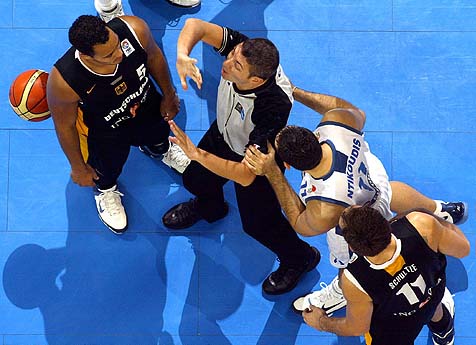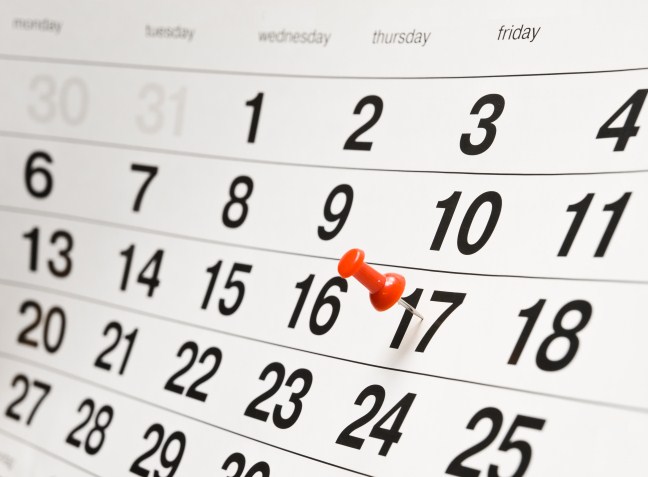 I brevet som FIBA World sendte til alle nasjonale forbund tidligere i år var det ikke bare krav om registrering av dommere som dømte i andre land enn de kommer fra, men også en sterk oppfordring til alle om å ha et disiplinæropplegg som skal beskytte dommerne. En stadig økende grad av dårlig oppførsel, både verbal og fysisk, gjør det vanskeligere å rekruttere dommere. Dette problemet er internasjonalt, og gjelder like mye på breddenivå som på elitenivå. NBBFs dommerkomite har i mange år merket seg denne trenden og har også uttrykt bekymring over dette. Brevet fra FIBA er nå på vei til NBBFs ansvarlige organer for å sette fokus på det som kan være et problem også for norsk basket.
I brevet som FIBA World sendte til alle nasjonale forbund tidligere i år var det ikke bare krav om registrering av dommere som dømte i andre land enn de kommer fra, men også en sterk oppfordring til alle om å ha et disiplinæropplegg som skal beskytte dommerne. En stadig økende grad av dårlig oppførsel, både verbal og fysisk, gjør det vanskeligere å rekruttere dommere. Dette problemet er internasjonalt, og gjelder like mye på breddenivå som på elitenivå. NBBFs dommerkomite har i mange år merket seg denne trenden og har også uttrykt bekymring over dette. Brevet fra FIBA er nå på vei til NBBFs ansvarlige organer for å sette fokus på det som kan være et problem også for norsk basket.
 Tidligere i vinter kom det som kjent et brev fra FIBA som omhandlet bruk av dommere på tvers av landegrenser, i praksis noe FIBA World vil begrense og ikke minst ha oversikt over både når det gjelder internasjonale dommere og forbundsdommere. NBBF har forlengst registrert, og fått godkjent, bruk av utenlandske statsborgere som dommere i sine nasjonale serier.
Tidligere i vinter kom det som kjent et brev fra FIBA som omhandlet bruk av dommere på tvers av landegrenser, i praksis noe FIBA World vil begrense og ikke minst ha oversikt over både når det gjelder internasjonale dommere og forbundsdommere. NBBF har forlengst registrert, og fått godkjent, bruk av utenlandske statsborgere som dommere i sine nasjonale serier.
Men brevet fra FIBA er også en bekymringsmelding til de nasjonale forbundene om dalende respekt for dommerrollen, og de ber om at det etableres klare og konsise straffereglementer som må benyttes mot utøvere som bryter mot de sportslige prinsippene i basketball og som ikke respekterer dommernes avgjørelser på banen.
Brevets innhold er av svært viktig prinsipiell betydning, ikke minst med tanke på rekruttering av unge dommere, og vi velger derfor å publisere den aktuelle delen av det:
Protection of Referees
Everybody agrees that officiating in any sport and in contact team sports in particular, is extremely difficult and can be highly stressful. Referees are required to know and understand the rules of the game and the mechanics of officiating. They also need to be physically fit and mentally strong enough to withstand the pressure before, during and after the game that comes simultaneously from many different parties including spectators, players, coaches, club managers and in some cases, even from individuals from leagues or the National Basketball Federations.
In order to reach the expected level of officiating of the game, full and loyal cooperation from all parties directly involved in the game is required. While each team can and will do its best to secure victory, this must be done in the spirit of sportsmanship and fair play and not at the expense of the referee.
Referees roles by definition require them to ensure that — other than difference in ability and standard of play — both teams have a fair and equal chance of winning the game. It is obvious that despite all their efforts, referees make errors as is the case within any sphere of human activity.
Via their educational and training systems, FIBA and the FIBA Zones strive to bring referees to the highest possible level for the good of the game. However, as mentioned above, there are still many cases where mobbing and psychological abuse exceeds by far any acceptable level, with cases of physical violence unfortunately also occurring. Such actions must not and cannot be accepted under any circumstances.
We often refer to the required collaboration of what we call the golden triangle (player, coach and referee), without which a game becomes impossible. It is obvious that without referees, the game cannot take place and yet, it is more and more difficult for many Federations to recruit new, young potential referees as they become aware of all the disadvantages of being a referee (family, profession, etc. in addition to all of the above), thereby opting for other activities.
For these reasons, we continue to strongly encourage all National Basketball Federations to develop and implement within their structure, governance and regulations, measures for the protection of the referees from interference (verbal or physical) and abuse by anyone directly involved in basketball. Such measures may range from a strong warning, to disciplinary and/or financial sanctions, and culminate in disqualification for life from any basketball related activity.
Also disciplinary regulations and processes must be clear, transparent and discouraging with the abuses and disrespect towards the person of the referee and his decisions on court. For example, some countries have rules that allow a serious infraction or verbal abuse to be commuted from a disqualification into a fine. In other circumstances, referees are left alone in their defense against undue pressure from leagues or clubs.
These are examples of lack of protection for referees which are counterproductive for the good governance of the game.

